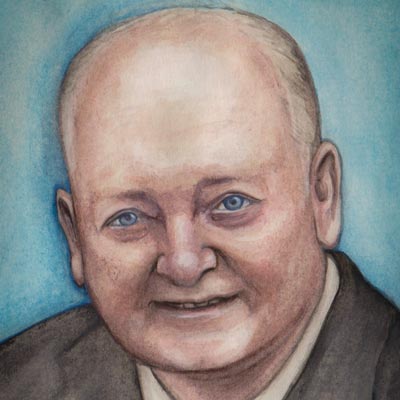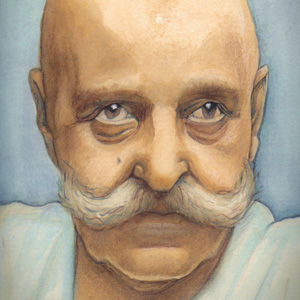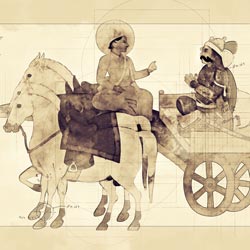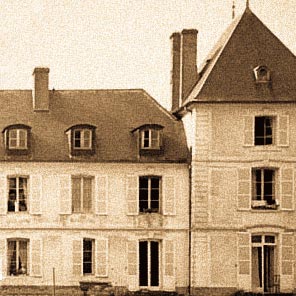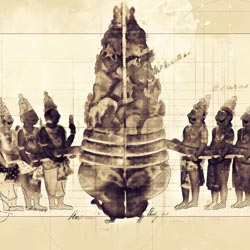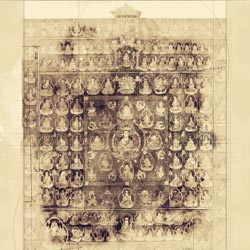
Dr. Maurice Nicoll’s work within the body of Fourth Way literature arguably represents the most complete, organized, and computational presentation available on the subject. His lucid formating of the whole network of linked ideas is totally faithful to the name given by Ouspensky to the encapsulated collection of teachings coming from Gurdjieff and the near East: the system. His teaching represents a true system, in which all concepts, including word, number, and symbol, are mutually interlinked and computationally compatible. The result is a mind-expanding apparatus of such mass and meaning that it can completely renew and rebirth one’s own perceptual intelligence.
Maurice Nicoll on Understanding
Of all the most prolific Fourth Way writers including, Gurdjieff, Ouspensky, and Collin, Dr. Nicoll’s teaching stands out as unparalleled for its qualities of being incredibly well digested and broadly apprehendable synthesis of esoteric thought. Nicoll’s famous maxim that ‘man is his understanding’ radiates and expresses itself actively throughout the records of his mentation. Ouspensky tells us that understanding and even knowledge itself is a proper fitting of one particular idea within a holistic landscape of nested ideas, but Nicoll most accurately materializes this definition. His use of the technical language of the Fourth Way system is precise and consistent to the degree that he is able to import, smoothly and neatly, additional terms from the disciplines of science, religion, and philosophy to his lexicon in such a way that they are understood and interactive with ideas in all other corners of his thought. This both sheds new light and brings expanded meaning to all nodes within the network that is his benefactive legacy of an elaborate instrument for psychological optimization.
Nicoll on Meaning
The central location of the need for meaning within the spectrum of man’s inner life was diagnosed accurately and acutely by Dr. Nicoll, who for years was known as London’s leading neurologist and one of Britain’s foremost psychologists. His salient recognition of the human desire for meaning as chief and utmost and his skillful definition of the disease that is meaninglessness, characterizes and runs like a thread through the tapestry of his archived cerebration. Nicoll writes that “if you dislike the word God, then say Meaning instead. The word God shuts some people’s minds. The word Meaning cannot. It opens the mind.”
Through his careful development and understanding, the preeminent significance of what the system refers to as the ‘food of impressions’ is elevated and made more readily translatable into lay terminology regarding quality and upliftment of life. Nicoll’s ideal of meaning also highlights and interfaces well with major societal memes such as the biblical distinction between the letter versus the spirit of the law, the fields of semantics and hermeneutics in philosophy, the denotation of the use of esoteric or inner knowledge, among countless other reciprocal dividends.
Dr. Nicoll on Nonviolence
Maurice Nicoll was a rare man of great knowledge, educated in science at Cambridge and recipient of a medical degree from The Royal Hospital of St. Bartholomew, as well as great being; he was known by all whose lives were touched by his as a compassionate, considerate, and generous spirit. Indeed, he is relatively alone in his escape from subsequent criticism about the harsh methods reputedly belonging to teachers of the Gurdjieffian system of psychological transformation. It was plausibly no coincidence that he placed the complete elimination and extinguishment of all forms of violence, psychological and physical, as the supreme teleological direction and result of genuine esoteric work. He saw this as the essential conclusion proceeding from Ouspensky’s task of not expressing and transforming all negative emotions. In his diaries, it is made clear and convincing that he believed the reason for war, including the conflict with Hitler’s Germany that he lived through, was the lack of understanding inside and between people. He saw the Biblical imperative ‘thou shalt not kill’ to apply strictly and universally, not only externally, but also within the realm of the psyche, where he repeatedly emphasized mindfulness and compassion as a correction for how we habitually treat one another in our internal thoughts.
Nicoll on Esoteric Christianity
When asked for an additional definition of the Fourth Way teaching, Mr. Gurdjieff somewhat famously remarked that it could be reckoned as being esoteric Christianity. Nicoll obviously resonated with this interpretation of the work and if he was not personally given the task by Gurdjieff, he certainly dedicated himself to giving a fairly full explication and translation of Abrahamic religion in the light of the system. As Ouspensky skillfully diagnosed the Lord’s Prayer and gave it fuller meaning and understanding, Dr. Nicoll did so with the Ten Commandments, the Sermon on the Mount, Revelation, each parable Christ gave in the Gospels, as well as other stories from the Hebrew Bible such as that of Lot, Exodus, and Creation, in his books like The Mark and The New Man. For many, even those who were raised within Western religions, Nicoll’s teaching reveals or deepens the meaning of the traditions and parables they learned in early childhood.
Maurice Nicoll on Dreamwork
In many of the Psychological Commentaries it is apparent that Dr. Nicoll is skillful in the art of dream analysis, a trade he presumably maintained from the time he spent with Dr. Jung, who remained a respected lifelong friend. The profound levels of meaning on topics such as violence, that Dr. Nicoll is able to extricate from the dreams of his students, as well as his own, is impressive to the extent that he seems unique and surprisingly unrecognized. Nicoll lucidly writes in his early work entitled Dream Psychology: “Just as the cartoon is a symbolic representation of circumstances affecting social or political life, which must be recognizable, if the symbolism is to be intelligible, so the dream gathers certain threads of interest into unexpected juxtaposition.” It appears that he was able to knowledgeably utilize the unconscious activity of the mind in sleep to the benefit of self-knowledge and the dispelling of illusions about oneself and one’s life.
Plato
Another of Maurice Nicoll’s trademark loves was Neoplatonism and he was able to successfully intersperse his psychological teachings with the advice given by Plato. Seemingly philosophical theories left by Plato such as that of knowledge, the soul, and the ideal are given concrete and practical understanding when held in the context of Fourth way notions such as levels of knowledge, the octave, and higher centers. He uses Plato’s famous Myth of the Cave as an illuminating analogy for the process of awakening and developing objective knowledge and consciousness by degrees that is the aim and hallmark of the Fourth Way.
Nicoll’s treatment of Platonic thought is characteristic of his ability and astuteness in assimilating and integrating the typically abstract language of everyday life into the meaningful and utilitarian vernacular of the work.
Maurice Nicoll: The Man of the Fourth Way
What was described by Gurdjieff and Ouspensky as the way of the ‘sly man’ would potentially be understood or formulated by Nicoll as the way of the integration of the life, a phrase he used as a subtitle for one of his books. He himself would embody this ideal, a man completely surrounded by and active within his world and its affairs, yet by virtue of his special knowledge and technique, utterly vertical and awakened to the higher dimensions of reality. Dr. Nicoll stood as living example of St. Paul’s injunction “be not conformed to this world: but be ye transformed by the renewing of your mind”. By his understanding of the word, the teaching of the Fourth Way, Nicoll was able to remain ‘living and active’ and to renew and rebirth himself in a continuous process of Metanoia, the evolution of consciousness that is stimulated through real psychological effort and understanding. Nicoll spoke of the biblical parable as “a transforming-machine between two levels of meaning”. His life itself was a testament to the power and efficacy of this device capable of bridging the gap between two otherwise disparate dimensions, which are in some places referred to the as the world and the Kingdom of Heaven.
Nicoll on The Present
Continuing the teaching of Ouspensky on time and perhaps foreseeing the powerful effect that many would decades later realize in the idea of the now, Nicoll devoted a large portion of his attention to the illusion of time and the eternity of the living present. Along with other diagrams and descriptions, he places time on a horizontal plane that is intersected vertically by the present, and additionally conceives of now as a sixth dimension, or third time dimension. He truthfully and poetically expresses “we must come to our senses to begin to feel now. We can only feel now by checking this time-man, who thinks of existence in his own way. Now enters us with a sense of something greater than passing-time. Now contains all time, all the life, and the aeon of the life. Now is the sense of higher space” and urges that “without this Moment, this now, all ‘men are asleep, even the Apostle, even the saint, even the lover.’” The command given by Christ to the leper, “rise, take up thy bed, and walk!” was interpreted by Maurice Nicoll in the spirit of an orthogonal emergence from the horizontal realm of sleep in time and an upward awakening into the life and action of a true vertical being in the dimension of now, as he himself was.
Maurice Nicoll on the Fourth Way
.
Frequently Asked Questions
Who was Maurice Nicoll?
– A British psychiatrist, neurologist, and writer, originally trained under Carl Jung.
– Known for his deep interest in esotericism, psychology, and spiritual transformation.
– One of the most respected and enduring teachers of the Fourth Way.
– Best known for his “Psychological Commentaries on the Teaching of Gurdjieff and Ouspensky,” a monumental work explaining Fourth Way ideas in accessible, practical language.
He stood out for his warm, compassionate character, and was unique among Fourth Way teachers for his emphasis on non-violence and inner kindness.
What was Maurice Nicoll's connection to the Fourth Way (Gurdjieff and Ouspensky)?
– He met Ouspensky in 1921 and quickly became one of his most trusted students.
– Through Ouspensky, Nicoll encountered Gurdjieff’s teaching, and even spent time at Gurdjieff’s Prieuré institute in France.
– Gurdjieff reportedly approved of Nicoll’s later teaching and sent people to work with him.
– After Ouspensky’s death, Nicoll continued to teach independently and preserve the Fourth Way in his own deeply reflective style.
What are Maurice Nicoll’s Psychological Commentaries on the Teaching of Gurdjieff and Ouspensky?
– They are clear, deeply thoughtful interpretations of Fourth Way ideas, especially from a psychological and Christian-esoteric angle.
– Nicoll focuses on practical inner transformation—how to work on oneself in daily life.
– The commentaries are known for their kind tone, clarity, and repetitive drilling of key ideas, making them incredibly useful for long-term inner work.
“[They] represent the most complete, organized, and computational presentation available on the subject.” He regarded the Commentaries as his real teaching legacy, not just commentary, but a living practice in written form.
How did Maurice Nicoll integrate psychology (especially Jungian ideas) with the Fourth Way?
The unconscious
Symbolism and dreams
Archetypes
– He used Jungian tools—especially dream analysis—as part of Fourth Way self observation.
– However, he went far beyond Jung by emphasizing inner transformation through consciousness, will, and esoteric meaning, rather than just analysis.
– He saw dreams as symbolic messages from deeper parts of the self, and he guided students to interpret them with esoteric and psychological significance. “The profound levels of meaning that Dr. Nicoll is able to extricate from dreams… is impressive to the extent that he seems unique and surprisingly unrecognized.” – Document
What are the main themes or ideas emphasized in Maurice Nicoll’s teachings?
– Understanding is Everything – Nicoll taught that man is his understanding. Real change comes not from belief or effort alone, but from a new way of seeing.
– Non-violence and Inner Kindness – He uniquely emphasized the transformation of negative emotions and the complete elimination of inner violence—even in thoughts. “He placed the complete extinguishment of all forms of violence… as the supreme teleological result of genuine esoteric work.”
– Esoteric Christianity – He interpreted the parables of Jesus and much of the Bible as symbolic guidance for inner transformation, not moral or religious dogma. He viewed Christ’s miracles and sayings (e.g., “Rise, take up thy bed, and walk”) as metaphors for waking up and remembering oneself.
– Living in the Present – Nicoll often returned to the idea of time and now, calling “Now” a higher dimension, even the sixth dimension. “Now is the sense of higher space. Without this Moment… all men are asleep—even the Apostle, even the saint, even the lover.”
– Integration of Life – He described the Fourth Way as “the way of the integration of the life”—working not by withdrawal, but by transforming ordinary life into spiritual practice.
– Impressions and Meaning – He emphasized the food of impressions (the way experiences aƯect the psyche) and linked it to the human need for meaning. “If you dislike the word God, then say Meaning instead… The word Meaning opens the mind.”

In 2022/24, the School of the Old New Method created a full-length documentary on George Gurdjieff.
